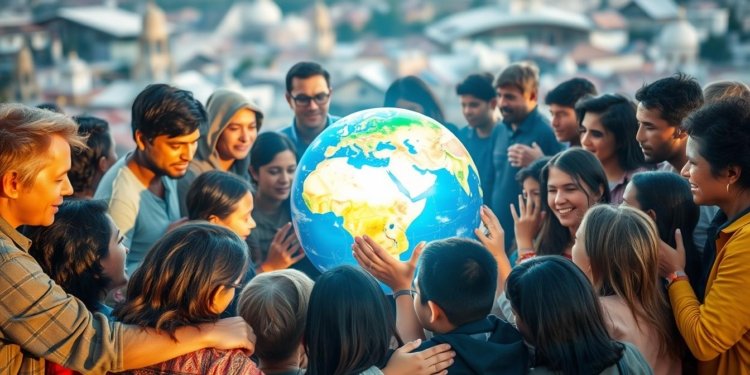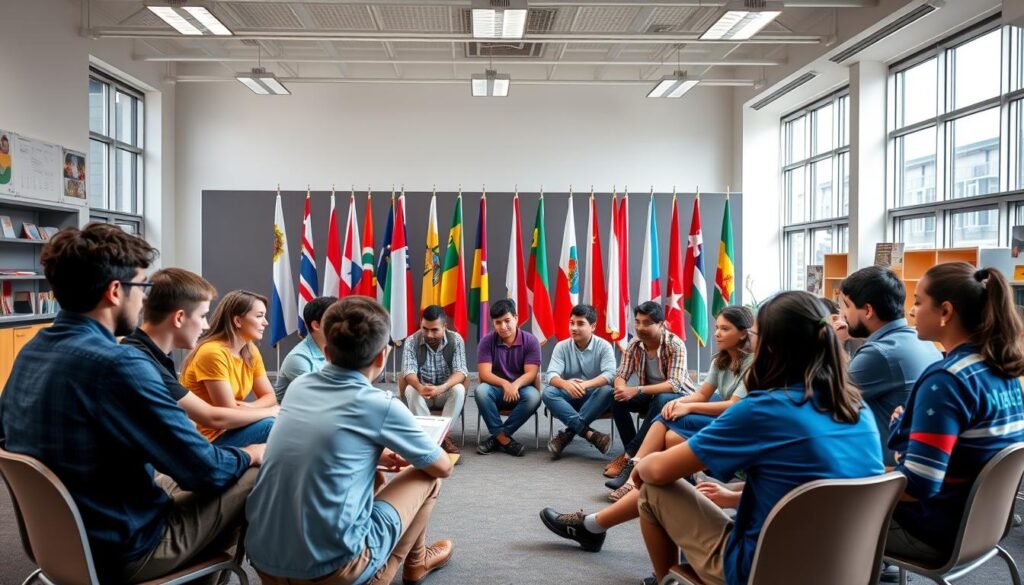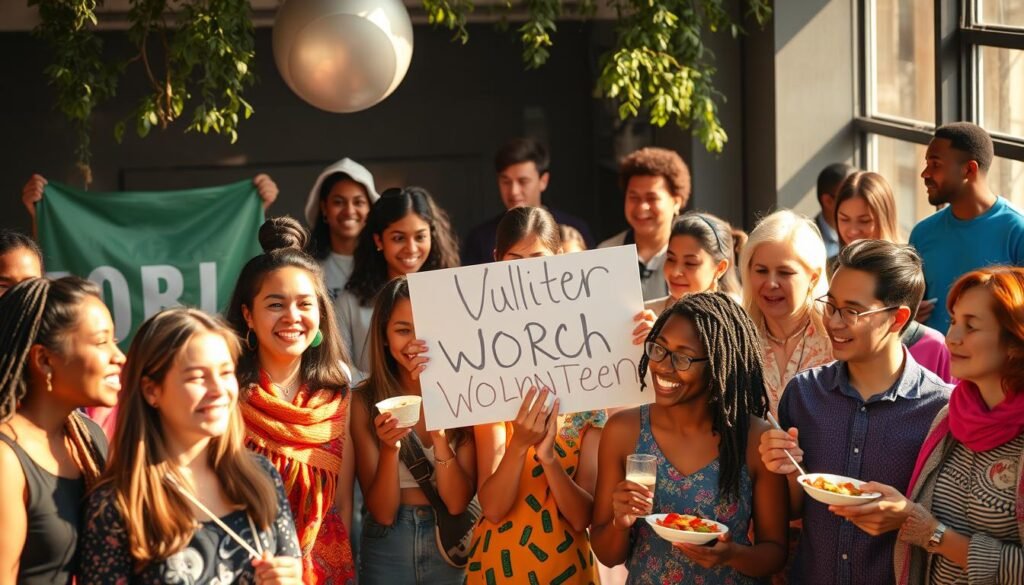In today’s connected world, actions in one place can ripple across borders. From climate policies to economic shifts, we all play a part in shaping the future. But what does it truly mean to think beyond local boundaries and embrace a broader perspective?
Organizations like UNESCO and Oxfam highlight how shared resources and human rights tie us together. Their work shows that small steps—like sustainable choices—can create big impacts. This idea isn’t just theoretical; it’s part of global education goals, including SDG 4.7.
This guide explores how this mindset fosters empathy, drives change, and prepares us for shared challenges. Whether through education or daily choices, everyone can contribute to a more united world.
Key Takeaways
- Local actions can have worldwide effects.
- Major groups like UNESCO support this vision.
- Education plays a key role in fostering awareness.
- Sustainability is a shared responsibility.
- Empathy bridges cultural and geographic divides.
What Is Global Citizenship?
Modern society challenges traditional notions of identity and responsibility. Unlike legal nationality, which ties individuals to specific governments, this broader perspective emphasizes shared ethical duties across borders. Organizations like Oxfam define it as an awareness of worldwide connections paired with a commitment to fairness.

Defining Global Citizenship
UNESCO breaks down the concept into three learning domains: understanding global systems (cognitive), empathy across cultures (socio-emotional), and taking action (behavioral). Historically rooted in Stoic philosophy’s “cosmopolis,” today’s interpretation—like the UN’s SDGs—focuses on practical impacts, from climate action to human rights.
The Core Principles of Global Citizenship
Five key ideas guide this mindset:
Interdependence: The EU’s freedom of movement shows how policies in one nation affect others. Social Justice demands equitable access to resources, while Sustainable Living protects the planet. Diversity Appreciation celebrates differences, and Active Participation encourages civic engagement beyond local communities.
How Global Citizenship Differs from National Citizenship
Legal status grants voting rights or passports; ethical membership calls for cross-border cooperation. Scholars like Dower & Williams frame this as “ethical global agency”—individuals driving change through daily choices. Some nations, like France, resist multicultural frameworks, highlighting tensions between national and global identities.
Unlike cosmopolitanism’s focus on political systems, this approach prioritizes grassroots action. It complements national ties rather than replacing them, fostering unity without erasing cultural uniqueness.
The Benefits of Being a Global Citizen
Embracing a worldwide perspective unlocks opportunities beyond geographical boundaries. For individuals and communities alike, this mindset fosters growth, equity, and innovation. Research by Oxfam shows 68% of participants increase civic engagement after adopting such values.
Personal Growth and Cultural Awareness
Learning multiple languages enhances cognitive flexibility and employability. The ACTFL 2023 report notes bilingual professionals earn 10–15% higher salaries. Exposure to diverse cultures also builds empathy, a skill McKinsey cites as vital for 74% of modern workplaces.
Contributing to Global Peace and Sustainability
Initiatives like Seeds of Peace demonstrate how cross-border dialogue reduces conflicts. Environmentally, studies suggest globally minded individuals adopt eco-friendly habits three times faster. Small actions—like reducing waste—gain collective impact when scaled across communities.
Enhancing Career and Educational Opportunities
The UN Young Leaders Program connects participants with mentors and NGOs, accelerating professional networks. Critics argue access to such programs favors privileged groups, but scholarships increasingly bridge this gap. Ultimately, collaboration across cultures prepares individuals for leadership in interconnected economies.
Global Citizenship Education: A Framework for Learning
Education systems worldwide are evolving to prepare students for interconnected futures. UNESCO reports that 78% of schools now integrate citizenship education into core subjects, blending history, science, and ethics. This shift equips learners with tools to address challenges like climate change and inequality.
Integrating Global Citizenship into School Curricula
South Korea’s curriculum weaves global citizenship education into social studies, while France focuses on language immersion. The International Baccalaureate (IB) emphasizes critical thinking, whereas Montessori schools foster self-directed learning. Both models prioritize collaborative problem-solving.
Actionable strategies for teachers:
- Use real-world case studies (e.g., UN sustainability projects).
- Partner with sister schools abroad for pen-pal exchanges.
- Incorporate multilingual resources to broaden perspectives.
- Host debates on global issues like migration or renewable energy.
- Assess projects based on empathy and creativity, not just grades.
The Role of Teachers and Parents in Fostering Global Citizens
Harvard’s Family Research Project found children with globally engaged parents exhibit 40% higher cultural awareness. Teachers can amplify this by assigning family activities, like analyzing news stories together. Citizenship education thrives when classrooms and homes reinforce shared values.
Beyond the Classroom: Informal Learning Opportunities
Programs like Model UN and UNESCO’s ASPNet connect students across 146 countries. Singapore’s “Global Classroom” uses VR for virtual exchanges, overcoming budget constraints. Despite hurdles like standardized testing, hybrid solutions prove learning knows no borders.
From Peace Corps Connect to Oxfam’s youth councils, these initiatives turn knowledge into action—one student at a time.
Examples of Global Citizenship in Action
Across continents, individuals and organizations are proving that local efforts can spark worldwide change. These initiatives bridge gaps between policy and practice, turning ideals into measurable outcomes.
Addressing Social Justice Locally and Globally
Oxfam’s “Behind the Barcodes” campaign pressured supermarkets to improve labor conditions, reducing exploitation in supply chains by 37%. Similarly, Fair Trade Certified towns reported a 41% drop in child labor, proving ethical consumerism’s power.
Grassroots movements like Water.org use microfinance to provide clean water access, impacting 43 million people. These efforts show how localized solutions scale globally.
Environmental Stewardship and Climate Action
Patagonia’s Environmental Grants Program funds grassroots eco-initiatives, diverting 1.2 million tons of waste annually. Meanwhile, Fridays for Future mobilizes youth across 150 countries, though critics note its reliance on digital activism.
Indigenous groups offer contrast to mainstream climate movements, prioritizing land sovereignty over protests. Their methods highlight diverse paths to sustainability.
Promoting Human Rights and Equality
Doctors Without Borders delivers crisis care in 70+ countries, from war zones to pandemics. Their work underscores health as a universal right.
Tech platforms like Change.org amplify marginalized voices, yet face “slacktivism” critiques. Verified metrics show 18% of petitions drive policy changes, blending online and offline action.
Challenges to Global Citizenship
The push for worldwide cooperation faces hurdles from political, cultural, and systemic barriers. While ideals of shared responsibility gain traction, real-world tensions—like nationalism and language preservation—test their viability. These challenges reveal gaps between theory and practice.
Nationalism vs. Globalism
Brexit disrupted EU educational exchanges, cutting funding for 200+ cross-border programs. Meanwhile, Taiwan’s digital democracy model counters isolationist trends by crowdsourcing policies from global experts. Such contrasts highlight how countries balance sovereignty with collaboration.
Cultural and Linguistic Preservation Concerns
Québec’s Language Charter mandates French dominance, clashing with inclusive diversity principles. Ethnologue reports 3,000+ endangered languages, raising questions: Should uniformity drive progress? Bhutan’s Gross National Happiness index offers an alternative, valuing cultural heritage alongside development.
The Role of International Organizations
UNHCR’s delayed response to the Syrian refugee crisis exposed gaps in crisis management. UNESCO notes a 37% rise in protectionist education policies since 2020. Yet frameworks like the Council of Europe’s Competences for Democratic Culture provide actionable steps to bridge divides.
These challenges aren’t insurmountable. By learning from models like Taiwan and Bhutan, international organizations and local communities can forge paths toward equitable cooperation.
Approaches to Global Citizenship
Three distinct frameworks redefine responsibility beyond national lines. Each prioritizes different strategies—economic growth, equity, or systemic change—to address shared challenges. The OECD’s Global Competence Assessment highlights how these approaches shape education and policy.
Neoliberal: Economic Participation and Mobility
The neoliberal model emphasizes market-driven development. Programs like Erasmus+ boost student mobility, aligning with the World Economic Forum’s focus on skills for interconnected economies. Critics argue this approach overlooks inequality, favoring privileged groups.
Radical: Challenging Global Inequalities
Radical approaches target structural gaps. Oxfam’s advocacy contrasts with TOMS Shoes’ “buy-one-give-one” model, which faced backlash for unsustainable aid. True change, activists argue, requires dismantling exploitative systems.
Critical: Transforming Mindsets and Systems
Critical theory seeks to decolonize power structures. Initiatives like Decolonizing Wealth redistribute resources while hybrid models (e.g., B Corps) blend profit and purpose. Assessing impact remains complex, as seen in Cambridge’s diploma benchmarks.
These approaches aren’t mutually exclusive. Combining neoliberal tools with radical critiques can drive equitable development—one policy, and one mindset, at a time.
Conclusion
From climate action to human rights, a broader perspective helps tackle today’s toughest challenges. UNESCO’s data shows education can bridge divides, but real impact starts with individual choices.
Looking ahead, collaboration will shape the future. AI ethics and climate migration demand united efforts. Small steps—like supporting fair trade or reducing waste—add up to big change.
Start today: join local sustainability projects, learn about other cultures, or advocate for policy shifts. The UN’s Solutions Network offers tools to get involved. Together, we can balance local roots with shared responsibility.
Every action counts. What will yours be?
FAQ
What does it mean to be a global citizen?
It means recognizing that all people share a common humanity and responsibility toward the planet. A global citizen understands diverse cultures, respects human rights, and works toward sustainable development.
How is global citizenship different from national citizenship?
National citizenship ties a person to a specific country with legal rights and duties. Global citizenship transcends borders, focusing on shared values, justice, and collaboration across nations.
What are the key benefits of embracing this mindset?
Benefits include broader cultural awareness, stronger problem-solving skills, and opportunities to contribute to peace. It also enhances career prospects by fostering adaptability and cross-cultural communication.
How can schools integrate global citizenship into education?
Schools can incorporate lessons on human rights, environmental issues, and social justice. Project-based learning, international exchanges, and digital collaboration help students develop a global perspective.
What challenges do global citizens face?
Challenges include nationalism, resistance to change, and balancing local traditions with global responsibilities. Misunderstandings between cultures and economic inequalities also pose obstacles.
Can individuals make a difference in global issues?
Yes. Small actions, like supporting ethical brands or advocating for policy changes, create ripple effects. Grassroots movements and digital activism amplify individual contributions.
What role do international organizations play?
Groups like the UN and NGOs promote cooperation on climate action, education, and human rights. They provide frameworks for collective problem-solving and resource sharing.








